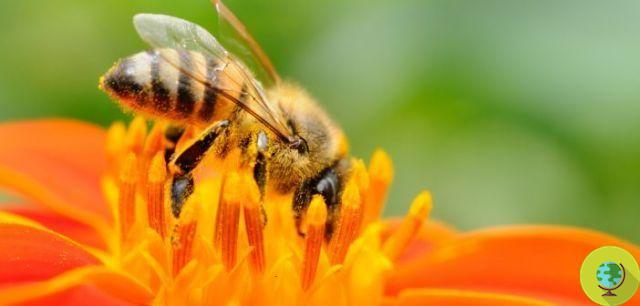
There is no peace for bees. Not only do pesticides and antibiotics threaten their lives. New research has shown that the fungicides used in almond orchards are also very dangerous to these valuable insects
He is about to end up run over, his mother saves himThere is no peace for the api. Not only i pesticides and antibiotics they threaten its life. New research has shown that fungicides used in almond groves they are very dangerous for these precious insects.
The new threat is called iprodione. When used alone or in combination with other common fungicides, this substance leads to a significant 10-day reduction in bee survival rate. (Apis mellifera).
Everything we see in nature depends, in some way, on them: they are essential for the reproduction of most plant species and, consequently, for the animals that derive nourishment from it. 75% of the world's crops depend on pollination. In other words: without bees there is no life.
However, their existence is seriously threatened. These little insects are dying at a rate of 30% per year. The causes are varied, from climate change to pesticides. To these is added a new enemy: a fungicide whose mission was to put an end to the fungi that attack almond trees but which ended up becoming dangerous for this precious little animal.
ALSO READ: BEE DEATH: IN EUROPE BEES POISONED BY 57 DIFFERENT PESTICIDES
Juliana Rangel and colleagues from Texas University's Department of Entomology tested the effects of fungicides on honey bees by monitoring the differences from bees not exposed to these substances.
READ also: ABUSE OF ANTIBIOTICS THAT IS KILLING BEES (AND ALSO HURTS HUMANS)
The results showed a significant increase in the mortality rate among bees exposed to fungicides Compared to others. In fact, insects exposed to the recommended concentration of iprodione died at a double or triple rate within 10 days. The effect was even stronger when Iprodione was combined with other fungicides.
ALSO READ: BEES ARE NOW OFFICIALLY AT RISK OF EXTINCTION (VIDEO)
It is not yet known what causes the negative effect of fungicides on bees.
"Our findings can help encourage new discussions about treatments and try to find different ways for treatments," said Adrian Fisher II, lead author of the study.
What can we do to save the bees?
To protect these precious insects, we first need to know what can harm them. For example, they can be avoided pesticides ed herbicides. Or prefer organic and local products, to help reduce the use of pesticides. In our small we can also plant some flowers, which favor its spread.
READ ALSO: BEES: LET'S SAVE THEM WITH A FLOWER. HERE ARE WHICH TO PLANT
Francesca Mancuso


























